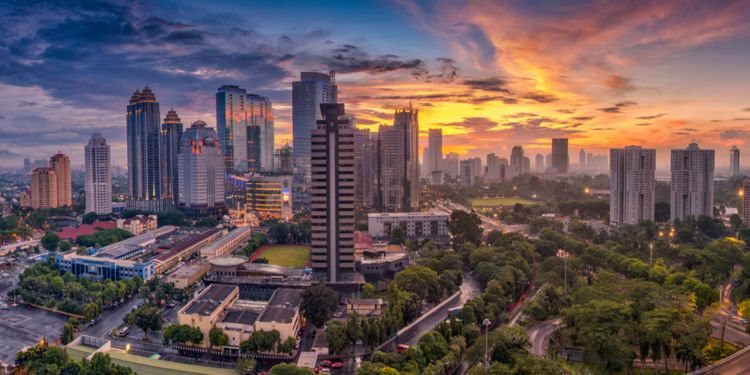
Climate in Jakarta
Due to its proximity to the equator, Jakarta tends to experience high temperatures surging up to 39°c all year round. The city also has an average humidity of 80%. So pack your sunscreen, as Jakarta's UV index averages 11 or higher.
Jakarta has a tropical and monsoonal climate, with a drier season running from June to September, while the rainy season lasts from October to May, with a peak in January and February. During this period, beware of flooding, which is a common problem in many parts of the city. It must be said, however, local authorities do their best to minimize flooding each year.
Geography of Jakarta
Jakarta is located on the northwest coast of the island of Java, the most populous of the Indonesian islands. The city is the capital of Indonesia, as well as its largest city, covering more than six hundred square kilometers. The name Jakarta comes from Jayakarta, its ancient name, which means "victorious city" in Sanskrit.
The city is an incredible metropolis that occupies the position of Indonesia's economic, political and business hub. In addition to being the seat of the country's government and the secretariat of the Association of Southeast Asian Nations (ASEAN), Jakarta is also home to Indonesia's most important financial institutions, such as Bank Indonesia and the Indonesian Stock Exchange, as well as the headquarters of many local companies and branches of multinationals.
Population and language in Jakarta
Jakarta, with a population of over 10 million, is an ethnic, religious and socio-economic melting pot. This vibrant mix is visible in the city's rich architectural and cultural heritage.
Jakarta is home to a large Muslim population that coexists peacefully with other religions.
For everyday communication, Bahasa Indonesia is the official language of the capital, but you will hear many other languages and dialects throughout the city.
Social life in Jakarta
Indonesians are very warm and welcoming. They do not hesitate to greet foreigners and smile at people they do not know. As an expat in Jakarta, feel confident that you will be able to converse with the locals without any problems. Most people in the city have a basic grasp of the English language. Naturally, politeness will be the little extra that will allow you to integrate, Indonesians being very friendly.
Your social life will depend greatly on what you like to do. In Jakarta, there is no shortage of places to interact with other expats and locals, from clubs to workshops to events to cafes to bars. Note that embassies often organize cultural exchanges, which can be an excellent opportunity to develop your social network in the capital city, Jakarta.
Nature in Jakarta
While it may be a little difficult to breathe some fresh air in this bustling city, Jakarta has many hidden treasures.
To enjoy some fresh air, head for Merdeka Square, which surrounds the iconic Monumen Nasional and Monas monuments. Alternatively, Suropati Park and Menteng Park, located in central Jakarta, will give you a chance to breathe in the green.
You can also visit Cattleya Park in West Jakarta, Taman Mini Indonesia Indah in East Jakarta, Kalijodo Park in North Jakarta and Setu Babakan in South Jakarta. The mangrove forest of Pantai Indah Kapuk in North Jakarta is also an ideal setup for a relaxing weekend.
If you prefer the beach and the sea, check out Ancol, which has several stunning beaches as well as themed amusement parks. On weekends, you can also visit some of the most beautiful islands in Kepulauan Seribu. Among the most famous islands are Bidadari Island, Pramuka Island, Ayer Island, Tidung Island, Harapan Island and Putri Island.
Getting around Jakarta
The city has an efficient and relatively reliable transportation system. In the city, hop on the famous Transjakarta bus or take advantage of the new MRT system. You can also get around Jakarta by cab, bajaj, bemo, angkot and ojek. This last means of transportation can be booked online through a mobile application. Like many large cities, Jakarta suffers from traffic congestion, especially during rush hour.
Expatriate life in Jakarta
As previously mentioned, Jakarta is one of the most popular cities for expats in Indonesia. Expect to spend about Rp 8 million per month, or about USD 600, not including rent. Overall, the cost of living in Jakarta is lower compared to other major cities worldwide.
Jakarta is also the country's most developed city, which means that you can live comfortably with an efficient transportation system, modern housing, large shopping malls, restaurants, quality educational facilities, etc.
Despite Jakarta's hectic and bustling nature, it is a welcoming city once you get your bearings.
Useful link:
We do our best to provide accurate and up to date information. However, if you have noticed any inaccuracies in this article, please let us know in the comments section below.
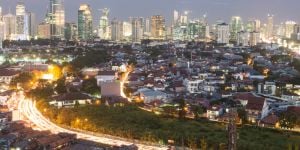
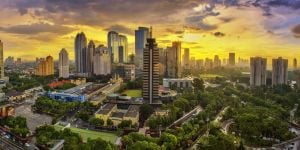
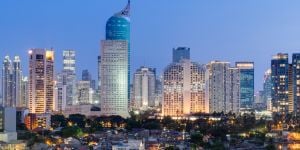
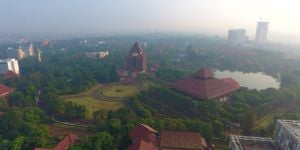



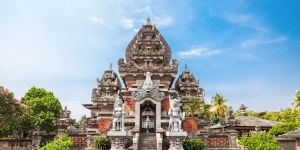




Comments